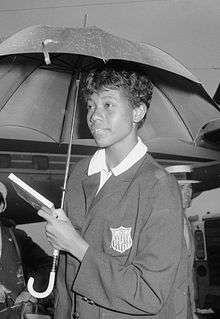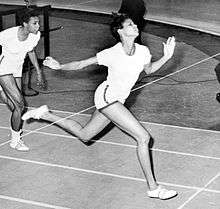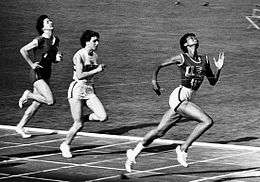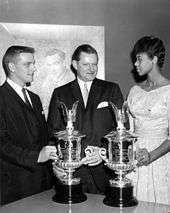Wilma Rudolph
 Rudolph in 1960 | ||||||||||||||||||||||
| Personal information | ||||||||||||||||||||||
|---|---|---|---|---|---|---|---|---|---|---|---|---|---|---|---|---|---|---|---|---|---|---|
| Full name | Wilma Glodean Rudolph[1] | |||||||||||||||||||||
| Nickname(s) |
Skeeter[2] The Black Gazelle The Tornado The Black Pearl | |||||||||||||||||||||
| Born |
June 23, 1940 Saint Bethlehem, Tennessee, United States | |||||||||||||||||||||
| Died |
November 12, 1994 (aged 54) Brentwood, Tennessee, United States | |||||||||||||||||||||
| Residence | Nashville | |||||||||||||||||||||
| Height | 5 ft 11 in (180 cm)[1] | |||||||||||||||||||||
| Weight | 130 lb (59 kg)[1] | |||||||||||||||||||||
| Sport | ||||||||||||||||||||||
| Sport | Track and field | |||||||||||||||||||||
| Club | TSU Tigerbelles, Nashville | |||||||||||||||||||||
Medal record
| ||||||||||||||||||||||
Wilma Glodean Rudolph (June 23, 1940 – November 12, 1994) was an American track and field sprinter who competed in the 100 and 200 meters dash. Rudolph was acclaimed the fastest woman in the world in the 1960s and competed in the 1956 and 1960 Olympic Games.[3]
At the 1960 Summer Olympics in Rome, Rudolph became the first American woman to win three gold medals in track and field during a single Olympic Games.[4][5][6][7] A track and field champion, she elevated women's track to a major presence in the United States. As a member of the black community, she is also regarded as a civil rights and women's rights pioneer. Along with other 1960 Olympic athletes such as Cassius Clay (later Muhammad Ali), Oscar Robertson, and Rafer Johnson, Rudolph became an international star due to the first world-wide television coverage of the Olympics that year.[8]
The upstart sprinter emerged from the 1960 Rome Olympics as "The Tornado, the fastest woman on earth".[9] The Italians nicknamed her La Gazzella Nera ("The Black Gazelle");[10] to the French she was La Perle Noire ("The Black Pearl").[11][12]
Biography
Rudolph was born prematurely at 4.5 pounds (2.0 kg) on June 23, 1940 in Saint Bethlehem, Tennessee,[1] the 20th of twenty two siblings;[6][7] her father, Ed, was a railway porter and her mother, Blanche, was a maid.[13] Rudolph contracted infantile paralysis (caused by the polio virus) at age four. She recovered, but wore a brace on her left leg and foot (which had become twisted as a result) until she was nine. She was required to wear an orthopedic shoe for support of her foot for another two years. Her family traveled regularly from Clarksville, Tennessee, to Meharry Hospital (now Nashville General Hospital at Meharry) in Nashville, Tennessee, for treatments for her twisted leg.[14] In addition, by the time she was twelve years old she had also survived bouts of polio and scarlet fever.

After her treatments were over in 1953, Rudolph chose to follow in her sister's footsteps and began playing basketball. While playing for her high school team, she was spotted by Tennessee State track and field coach Ed Temple. Being discovered by Temple was a major break for a young athlete. The day he saw the tenth grader for the first time, he knew he had found a natural athlete. Rudolph had already gained some track experience on Burt High School's track team two years before, mostly as a way to keep busy between basketball seasons.[15] Rudolph joined Temple's summer program at Tennessee State and trained regularly, racing with his Tigerbelles for two years.[13]
By the time she was sixteen, she earned a berth on the U.S. Olympic track and field team and came home from the 1956 Melbourne Games to show her high school classmates an Olympic bronze medal that she had won in the 4 × 100 m relay.[1][13]
In 1959, Rudolph won a gold medal in the 4 × 100 m relay at Pan American Games (with Isabelle Daniels, Barbara Jones, and Lucinda Williams) and an individual silver in the 100 m. The same year she won the AAU 100 m title and defended it for four consecutive years. During her career, she also won three AAU indoor titles.[1]

At the 1960 Summer Olympics in Rome she won three Olympic sprint gold medals on a cinder track: in the 100 m, 200 m and 4 × 100 m relay. As the temperature climbed toward 110 °F (43 °C), 80,000 spectators jammed the Stadio Olimpico. Rudolph ran the 100 m dash in a phenomenal 11 seconds flat. However, the time was not credited as a world record, because it was wind-assisted; coincidentally, Jesse Owens' gold medal in the same event 24 years earlier also was not classified as a record because it was wind-assisted. She also won the 200 m dash in 23.2 seconds, a new Olympic record. After these wins, she was being hailed throughout the world as "the fastest woman in history". Finally, on September 11, 1960, she combined with Tennessee State teammates Martha Hudson, Lucinda Williams and Barbara Jones to win the 4 × 100 m relay in 44.5 seconds, setting a world record.[13] Rudolph had a special, personal reason to hope for victory—to pay tribute to Jesse Owens, the celebrated American athlete who had been her inspiration, also the star of the 1936 Summer Olympics, held in Berlin, Germany.[16]
Following the post-games European tour by the American team Rudolph returned home to Clarksville. At her wishes, her homecoming parade and banquet were the first fully integrated municipal events in the city's history.[13]
Rudolph retired from track competition in 1962 at age 22 after winning two races at a U.S.–Soviet meet at Stanford University.
She got a job teaching second grade in her childhood school. Conflict forced her to leave the position. She moved to Indianapolis to head a community center. Then she moved to St. Louis Missouri, then Detroit, Michigan, and then returned to Tennessee for a time in the late 60s before moving again to California. She then lived in Chicago.
Awards and honors

Rudolph was United Press Athlete of the Year 1960 and Associated Press Woman Athlete of the Year for 1960 and 1961. Also in 1961, the year of her father's death, Rudolph won the James E. Sullivan Award, an award for the top amateur athlete in the United States, and had a private meeting with President John F. Kennedy in the Oval Office.[4][5]
She was voted into the National Black Sports and Entertainment Hall of Fame in 1973[17] and the National Track and Field Hall of Fame in 1974.[7][18]
She was inducted into the U.S. Olympic Hall of Fame in 1983, honored with the National Sports Award in 1993,[19] and inducted into the National Women's Hall of Fame in 1994.[20]
In 1994, the portion of U.S. Route 79 in Clarksville, Tennessee between the Interstate 24 exit 4 in Clarksville to the Red River (Lynnwood-Tarpley) bridge near the Kraft Street intersection was renamed to honor Wilma Rudolph.[19]
Career and family
In 1963, Rudolph was granted a full scholarship to Tennessee State University where she received her bachelor's degree in elementary education.[4] After her athletic career, Rudolph worked as a teacher at Cobb Elementary School, coaching track at Burt High School, and became a sports commentator on national television.
Rudolph was married twice. On October 14, 1961, she married Willie Ward, a track star at North Carolina College at Durham,[21] only to divorce him 17 months later. In summer 1963 she married her high school sweetheart Robert Eldridge, with whom she already had a daughter born in 1958.[4][22] They had four children:[7] Yolanda (b. 1958), Djuanna (b. 1964), Robert Jr. (b. 1965) and Xurry (b. 1971).[4][5][23] She divorced Eldridge after 17 years of marriage,[19] and returned to Indianapolis where she raised her children and hosted a local TV show.
Death
In July 1994, shortly after her mother’s death, Rudolph was diagnosed with a brain tumor. She died of cancer at age 54 on November 12, 1994 in her home in Nashville.[1][24] Rudolph also had throat cancer. She was interred at Edgefield Missionary Baptist Church in Clarksville, Tennessee. At the time of her death, she had four children, eight grandchildren, and many nieces and nephews.[25] Thousands of mourners filled Tennessee State University's Kean Hall on November 17, 1994 for the memorial service in her honor. Others attended the funeral at Clarksville's First Baptist Church. Across Tennessee, the state flag flew at half-mast.
On August 11, 1995 (nine months after Rudolph's death), Tennessee State University dedicated its new six-story dormitory the "Wilma G. Rudolph Residence Center". On November 21, 1995, a black marble marker was placed on her grave in Clarksville's Foster Memorial Garden Cemetery by the Wilma Rudolph Memorial Commission. In 1997, Governor Don Sundquist proclaimed that June 23 be known as "Wilma Rudolph Day" in Tennessee.[5]
Legacy
In 1994, the name Wilma Rudolph Boulevard was given to the portion of U.S. Route 79 in Clarksville, Tennessee.[19]
In August 1995, the Wilma G. Rudolph Residence Center was dedicated at Tennessee State University. The six story building currently houses upper class and graduate women. It is furnished with a computer lab, beauty salon, cafeteria and provides Wi-fi in each room.[26]
The Woman's Sports Foundation Wilma Rudolph Courage Award is presented to a female athlete who exhibits extraordinary courage in her athletic performance, demonstrates the ability to overcome adversity, makes significant contributions to sports and serves as an inspiration and role model to those who face challenges, overcomes them and strives for success at all levels. This award was first given in 1996 to Jackie Joyner-Kersee.[27]
A life-size bronze statue of Rudolph stands at the southern end of the Cumberland River Walk at the base of the Pedestrian Overpass, College Street and Riverside Drive, in Clarksville.[28]
In 2000, Sports Illustrated magazine ranked Rudolph as number one on its listing of the top fifty greatest sports figures in twentieth-century Tennessee.[29] A year before, she was ranked as 41st greatest athletes of the 20th century by ESPN.[19]
Following the withdrawal of U.S. troops from Berlin in 1994, Berlin American High School (BAHS) was turned over to the people of Berlin and became the "Gesamtschule Am Hegewinkel". The school was renamed the "Wilma Rudolph Oberschule" in her honor in the summer 2000.[30]
On July 14, 2004, the United States Postal Service issued a 23-cent Distinguished Americans series postage stamp in recognition of her accomplishments.[31]
In 1977, a made-for-TV docudrama titled Wilma (also known as The Story of Wilma Rudolph) was produced by Bud Greenspan; it starred Shirley Jo Finney, Cicely Tyson, Jason Bernard and Denzel Washington in one of his first roles.[32]
In 2015, UK film Production Company Pixel Revolution Films was commissioned by Positive Edge Education Ltd to produce three short inspiration dramas to be screened in schools, Wilma Rudolph’s story was chosen to be one of the films. Written and directed by Ian and Dominic Higgins, the film was titled Unlimited.[33]
References
- 1 2 3 4 5 6 7 "Wilma Rudolph". sports-reference.com. Sports Reference LLC. Retrieved 27 August 2014.
- ↑ http://www.biography.com/people/wilma-rudolph-9466552
- ↑ Van West, Carroll (1998). Tennessee Encyclopedia of History & Culture. Nashville, TN: Tennessee Historical Society/Rutledge Hill Press. p. 813. ISBN 1558535993.
- 1 2 3 4 5 Smith (2006), p. xxii.
- 1 2 3 4 "Wilma Rudolph biography". Women in History. Archived from the original on 2012-11-04. Retrieved June 11, 2007.
- 1 2 1960: Rudolph takes third Olympic gold. BBC.
- 1 2 3 4 Roberts, M.B. Rudolph ran and world went wild. espn.go.com
- ↑ Ruth, Amy (2000), Wilma', New York: Lerner Publications. ISBN 978-0-8225-4976-5, pp. 34, 61.
- ↑ Biracree, Tom (1988), Wilma Rudolph.
- ↑ Jan Onofrio (1 June 1999). Tennessee Biographical Dictionary. North American Book Dist LLC. p. 1. ISBN 978-0-403-09700-5.
- ↑ Biracree (1988), p. 82.
- ↑ The Fastest Female, Time Magazine, Monday, September 19, 1960.
- 1 2 3 4 5 Rob Bagchi (June 1, 2012). "50 stunning Olympic moments No35: Wilma Rudolph's triple gold in 1960". The Guardian.
- ↑ Plowden, Martha Ward (1996). Olympic Black Women. Tennessee State University Library: Pelican Publishing Company. p. 121. ISBN 1-56554-080-8.
- ↑ Biracree (1988), p. 47
- ↑ Biracree (1988), p. 16
- ↑ National Black Sports and Entertainment Hall of Fame at the Wayback Machine (archived February 7, 2009). harlemdiscover.com
- ↑ National Track and Field Hall of Fame. Usatf.org. Retrieved on November 16, 2013.
- 1 2 3 4 5 Smith (2006), p. xxiii.
- ↑ Wilma Rudolph at the Wayback Machine (archived September 29, 2007). Women's Hall of Fame. greatwomen.org
- ↑ "The Eagle (1960)".
- ↑ Verschoth, Anita (September 7, 1964) "Slight Change Of Pace For Wilma". sportsillustrated.cnn.com.
- ↑ Chamberlain, Charles (February 22, 1973) Will Wilma Rudolph Eldridge's Daughter Add To Three Olympic Gold Medals Her Mom Won In International Competition?. Gettysburg Times.
- ↑ Amy Ruth (2000). Wilma Rudolph. Twenty-First Century Books. p. 97. ISBN 978-0-8225-4976-5.
- ↑ Smith, Maureen Margaret (2006), Wilma Rudolph: A Biography, Greenwood Press, ISBN 0313333076.
- ↑ Lovett, Bobby (June 20, 2016). "Wilma Rudolph and the TSU Tigerbelles" (PDF). Tennessee State University.
- ↑ Wilma Rudolph Courage Award at the Wayback Machine (archived September 28, 2007). womensportsfoundation.org.
- ↑ What To See at the Wayback Machine (archived August 4, 2009). clarksville.tn.us.
- ↑ Lovett, Bobby. Wilma Rudolph (1940–1994) and the TSU Tigerbelles at the Wayback Machine (archived October 30, 2013), Tennessee Encyclopedia of History and Culture
- ↑ Wilma-Rudolph-Oberschule at the Wayback Machine (archived July 27, 2009). be.schule.de.
- ↑ Postal Service Honors Wilma Rudolph with 'Distinguished America. depauw.edu. July 14, 2004.
- ↑ Wilma (1977). IMDb.
- ↑ Unlimited (2015). IMDb.
Bibliography
- Biracree, Tom (1988) Wilma Rudolph: Champion Athlete, Chelsea House Publishers, New York, ISBN 1555466753
- Smith, Maureen Margaret (2006) Wilma Rudolph: A Biography, Greenwood Press, ISBN 0313333076
- Braun, Eric. Wilma Rudolph, Capstone Press, (2005) – ISBN 0-7368-4234-9
- Coffey, Wayne R. Wilma Rudolph, Blackbirch Press, (1993) – ISBN 1-56711-004-5
- Conrad, David. Stick to It!: The Story of Wilma Rudolph, Compass Point Books (August 2002) – ISBN 0-7565-0384-1
- Harper, Jo. Wilma Rudolph: Olympic Runner (Childhood of Famous Americans), Aladdin (January 6, 2004) – ISBN 0-606-29739-1
- Krull, Kathleen. Wilma Unlimited: How Wilma Rudolph Became the World's Fastest Woman, Harcourt * Children's Books; Library Binding edition (April 1, 1996) – ISBN 0-15-201267-2
- Maraniss, David. Rome 1960: The Olympics That Changed The World, Simon & Schuster, (2008) – ISBN 1-4165-3408-3
- Ruth, Amy. Wilma Rudolph, Lerner Publications (February 2000) – ISBN 0-8225-4976-X
- Schraff, Anne E. Wilma Rudolph: The Greatest Woman Sprinter in History, Enslow Publishers, (2004) – ISBN 0-7660-2291-9
- Sherrow, Victoria. Wilma Rudolph (On My Own Biographies), Carolrhoda Books (April 2000) – ISBN 1-57505-246-6
- Streissguth, Tom. Wilma Rudolph, Turnaround Publisher, (2007) – ISBN 0-8225-6693-1
External links
| Wikimedia Commons has media related to Wilma Rudolph. |
- Wilma Rudolph (1940–1994). IMDb.com
- Whitehouse Kids, Wilma Rudolph
- Sports Heroes, Wilma Rudolph
- Wilma Rudolph Joins DePauw Staff
- Wilma Rudolph at Find a Grave
- Wilma Rudolph's story on the website of the 2008 Summer Olympics
